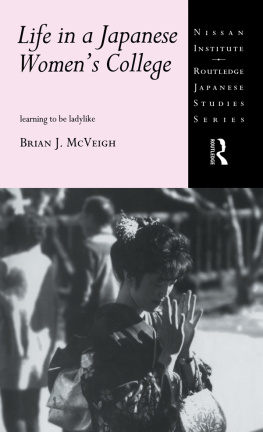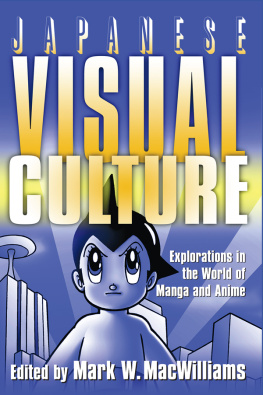Interpreting Japan
Written by an experienced teacher and scholar, this book offers university students a handy how to guide for interpreting Japanese society and conducting their own research. Stressing the importance of an interdisciplinary approach, Brian McVeigh lays out practical and understandable research approaches in a systematic fashion to demonstrate how, with the right conceptual tools and enough bibliographical sources, Japanese society can be productively analyzed from a distance.
In concise chapters, these approaches are applied to a whole range of topics: from the aesthetics of street culture; the philosophical import of sci-fi anime; how the state distributes wealth; welfare policies; the impact of official policies on gender relations; updated spiritual traditions; why manners are so important; kinship structures; corporate culture; class; schooling; self-presentation; visual culture; to the subtleties of Japanese grammar. Examples from popular culture, daily life, and historical events are used to illustrate and highlight the color, dynamism, and diversity of Japanese society.
Designed for both beginning and more advanced students, this book is intended not just for Japanese studies but for cross-cultural comparison and to demonstrate how social scientists craft their scholarship.
Brian J. McVeigh is presently training in counseling at the School of Health Sciences, Sage Graduate School and teaches at the School of Government and Public Policy, University of Arizona. The author of seven books, he is currently investigating the history of Japanese psychology.
Leading revisionist scholar Brian McVeigh has written a highly original book, synthesising his critical readings of Japanese society into an easily accessible format. This provocative text will stimulate class discussions, and enable students to gain a ready understanding of the key debates in Japanese studies. I recommend it very highly.
Duncan McCargo, Professor of Political Science,
University of Leeds, UK
Brian McVeighs book provides the new paradigm of Japanese Studies. All readers that are interested in Japan, shackled by several stereotypical views to Japan, involved in teaching, etc. will be thrilled with his brilliant insight towards various important issues about Japan.
Akiko Sugawa-Shimada, Associate Professor,
Yokohama National University, Japan
In this crisp introduction to Japan, students are provided with concepts that will help them make sense of a fascinating and complex society. By including in his scope imperial weddings, student uniforms, patterned etiquette, new religions, and manga icons, McVeigh introduces general readers to the breathtaking richness and diversity of contemporary cultural life.
Laura Miller, Endowed Professor of Japanese Studies,
University of Missouri-St. Louis, USA
Brian McVeigh distils twenty-five years of research, providing a thorough and fresh approach to viewing Japan through multiple lenses and locations. As much an introduction to classic social-scientific methods as a refreshing case study of Japanese culture and society, this useful book also includes numerous suggestions for further study.
Debra J. Occhi, Professor of Anthropology,
Miyazaki International College, Japan
Every effort has been made to contact copyright holders for their permission to reprint material in this book. The publishers would be grateful to hear from any copyright holder who is not here acknowledged and will undertake to rectify any errors or omissions in future editions of this book.
First published 2014
by Routledge
2 Park Square, Milton Park, Abingdon, Oxon, OX14 4RN
and by Routledge
711 Third Avenue, New York, NY 10017
Routledge is an imprint of the Taylor & Francis Group, an informa business
2014 Brian J. McVeigh
The right of Brian J. McVeigh to be identified as author of this work has been asserted by him in accordance with the Copyright, Designs and Patents Act 1988.
All rights reserved. No part of this book may be reprinted or reproduced or utilised in any form or by any electronic, mechanical, or other means, now known or hereafter invented, including photocopying and recording, or in any information storage or retrieval system, without permission in writing from the publishers.
Trademark notice: Product or corporate names may be trademarks or registered trademarks, and are used only for identification and explanation without intent to infringe.
British Library Cataloguing in Publication Data
A catalogue record for this book is available from the British Library
Library of Congress Cataloging in Publication Data
McVeigh, Brian J.
Interpreting Japan: approaches and applications for the classroom / Brian J. McVeigh.
pages cm
Includes bibliographical references and index.
1. JapanCivilization. 2. JapanSocial life and customs. 3. JapanSocial conditions. I. Title.
DS821.M436 2014
952dc23
2013050179
ISBN: 978-0-415-73014-3 (hbk)
ISBN: 978-0-415-73016-7 (pbk)
ISBN: 978-1-315-85055-9 (ebk)
Typeset in Sabon
by GreenGate Publishing Services, Tonbridge, Kent
Contents
The purpose of this book: making visible academic approaches
In a sign of our networked, interconnected, and plugged-in times, we are flooded with information, images, and pictures. This inundation, which takes the form of reproductions, replicas, copies, duplicates, and facsimiles of all types, gives us the illusion that knowledge is at our fingertips, ready to be Googled, downloaded, and printed out at the press of a single key. The drawback to all this convenience is that impressions are confused with evidence and opinions conflated with facts. Appearances are taken for reality, and what at first glance possesses solid factness often turns out on closer inspection to be something fleeting. Another serious downside to the relentless downpour of data is that our critical skills of filtering, sifting, and scrutinizing information are weakened. It becomes imperative, then, to remind those working within an educational context how to critically analyze, dissect, and evaluate. It is also important to teach the process behind a completed product (i.e., scholarly works).
That the need for interpretive intellectual tools in a world flooded with information is vital and is primarily why I wrote this book. Before proceeding, a few remarks on what type of book this is not.
This is not a research monograph exploring in a detailed, nuanced manner a specific aspect of Japanese society. It does not claim to be a state-of-the-art look at the latest research or a summation or interpretation of previous books about Japan. Rather, it is a sort of handy how to manual for dissecting a society based on over two-and-a-half decades of researching, working in, and teaching about Japan. The focus is decidedly on the applicable, approachable, and accessible. Nor is this a navelgazing I-was-in-the-field book. Finally, I might add that for my purposes I avoid the Japan-is-about-to-change or Japan-should-be-changing angle; I mention this because this theme inspires not a small number of works on Japan. Of course, though this book is useful for anyone going into the field, I wrote it with the realistic assumption that many students will probably never visit Japan or, if they do, their trip will most likely be relatively brief.
Below I comment on some related motivations behind this work.
Making visible analytical methods







